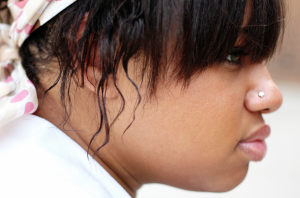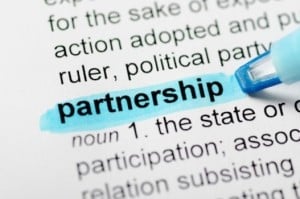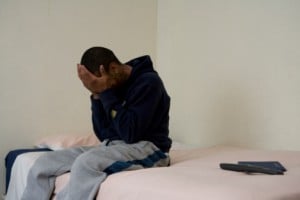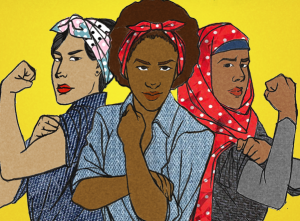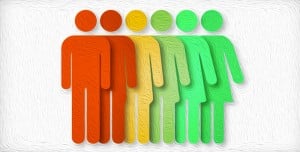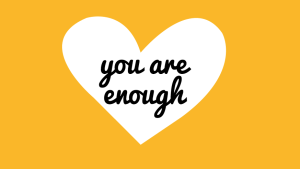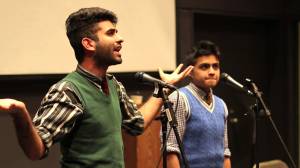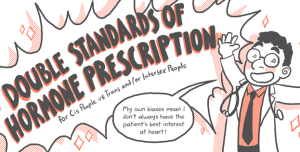People are coming together.
In the midst of state-sanctioned violence against Black and Brown people; as trans women of color continue to experience transphobia, erasure, and violence; as gentrification continues to displace people of color out of communities they’ve lived in for decades, people are coming together to push back against oppressive systems.
Some of the most empowering moments I’ve witnessed (and been a part of), as an activist, have involved the coming together of many different groups and identities for common causes.
This sort of solidarity, the kind that involves many of us – both privileged and oppressed – has the power to create broader awareness.
It shows us, for instance, that “gender issues” are not solely for women or queer and trans people to bear the burden of.
It reminds those on the sidelines that silence in the wake of others’ oppression is complicit. It demonstrates that we are all impacted by one another’s oppression in varying ways.
It reminds those targeted by oppression that we are not alone.
And as I’ve worked alongside these fierce revolutionaries and allies, I have been truly moved by what we can accomplish.
Solidarity is not only inspiring – it’s also essential for our radical efforts and system-shattering intentions of eradicating oppression to come to fruition.
But sometimes after these actions, when I’m back at home alone or in a debriefing space, it’s back to business as usual, and sometimes business as usual looks very contradictory to some of our values in the streets:
It looks like us prioritizing our own individual political power and recognition over collective liberation.
It looks like us talking shit about each other behind our backs while pretending to be unified in public.
It looks like us being harshly unforgiving of one another for making mistakes and being human.
We call for support and appear in solidarity when we need to, but can be remarkably unloving and even abusive toward one another otherwise.
And these aren’t new issues – interpersonal and political, or “private versus public” debates have been present in activist spaces for a long time.
Whether it is political or personal practices (or both) that divide us, we need to remain aware of how our behavior can undermine our organizing and harm us.
Why?
Because the personal is political, and what we do (or don’t do) to one another shifts our collective power greatly, for better or for worse.
Whether it’s prioritizing individual praise and recognition over our movements, or our unwillingness to forgive one another and to be held accountable – we must continue to challenge practices that don’t align with our struggles for liberation.
And below are several of those practices that I hope we can continue to work on challenging.
1. We Must Stop Prioritizing the Recognition of Individuals Over Our Collective Work
When I recently moved back to the Bay Area, one of the reasons I did so was the history and current iterations of Black-led organizing. But having limited knowledge of how things were done in organizing community here, I felt hesitant to speak up in those spaces both as a new voice and as someone with a lot of privilege.
Something that intensified my hesitation was the perception of reputation among organizers – some individuals seemed to be more vocal, respected, and well known than others.
And although I came to learn that a lot of these activists were modest and down to earth as ever, sometimes the outward appearance of them is that they are part of exclusive cliques that which only those who have been stamped “True Revolutionary” have been granted access.
I think it makes sense for individuals to want to be recognized for the work that we’re doing in our communities – and for our communities to want to recognize those people.
As oppressed folks, we have been ignored and silenced from so many spaces and part of sustaining our momentum is celebrating our victories.
But I also think there’s a big difference between becoming a leader because of our visibility and involvement in struggles that are important to us, and being involved in the movement in order to gain notoriety.
Further, no one person, or small group of people, should be perceived as “the face of the movement.
If a person or group finds themselves in that situation, they should immediately make shifts to bring the attention back to the collective work that is being done for the movement.
When leadership is gained at the expense or silencing of other people who are equally committed to liberation work, it’s not effective or anti-oppressive.
This classic example comes to mind: A group of Black activists who’ve come together to protest police brutality successfully hold multiple direct actions that begin to gain media attention. They’ve all put in countless hours and late-night meetings towards their cause, united in their desire to end violence within their communities.
But when an opportunity to speak to the press about their work is presented, the need to identify one or two representatives arises.
It’s in situations like these where motivations are revealed or questioned. Suddenly, there are arguments over who’s done the most work, whose story should be told, who has been an organizer for longer, who works for which non-profit, and so on.
Folks begin to tear one another down and attacking personal character. The group becomes divided.
What other alternatives exist in these types of challenges?
How can we hold onto our contributions as individuals without diminishing the importance of each of us? How do we prioritize anti-oppression, liberation, and collective as our motivations?
When we’re only concerned with our reputations as individuals, rather than what we’re trying to accomplish collectively, we may be threatening how powerful we are as a whole.
2. Our Personal Practices Must Match Our Political Values
The groups that I’m a part of are often very small – an “everyone knows everyone” type of close-knit community.
Queer and trans people of color (QTPOC), for instance, often come together to share collective healing, to relate to one another, to be sexy, and to have fun – and this is one community that I draw huge amounts of strength and resilience from.
Many of us are invested in caring for each other when the rest of the world refuses us, and many of us are committed to ending the daily violence and oppression that impacts us all.
But sometimes we fail those goals outside of (and within) our shared political spaces.
Many of us are familiar with issues of interpersonal and intimate partner violence in our communities – an issue that often goes unchallenged. Sometimes we hold an individual’s political influence over their need to be accountable in their personal lives.
This is one of the most extreme yet a fairly common way that our personal and stated political actions and values don’t add up.
We often operate from the belief that our relationships (especially intimate) are private – separate from our place in community and movement work. In reality, and especially in small communities, the two are inextricably connected.
What does it mean, for instance, to publicly support #BlackLivesMatter while perpetuating anti-Black physical and emotional violence “privately?”
We can’t end violence and oppression while practicing it at home, or ignoring it within our spaces because we want to believe better of each other.
When we choose to perpetuate and/or ignore abuse of any kind, we are supporting the tools of the oppressor.
There are many other ways that our personal practices conflict with our political spheres – some of which continue because they are so commonplace.
Lines are blurred between interpersonal and political in the case of “shit-talking” or gossiping. Gossip is easy to do and is part of human nature, but also has implications when we’re tearing down other activists.
I’ve occasionally caught myself going off about how I don’t like so-and-so’s attitude or whatever personal trait – that’s how gossip happens – often unconsciously.
But when it comes time to rally, I can’t authentically show up at an event, look them in their face and hug them, and tell them they’re my family, that we’re in the struggle together.
How would our communities strengthen and shift if we spent the same amount of time uplifting and supporting one another as we did speaking badly about each other? Understanding that conflicts happen, we can further damage one another by continuing to attack each other’s character.
We all contradict ourselves at times. It takes time to unlearn this type of behavior. Yet in the midst of all our ego and pride and anger with each other, Black people are still being brutalized by police and state-sanctioned violence. I still fear for my brothers’ and my own safety.
There is still oppression in the world. We may lose sight of all of that in our insecurities and fear.
One of the strategies of enslavement and oppression has been to tear marginalized people apart and pin us against one another so that we cannot be as powerful.
It is not enough for us to take a political stance on something if we are not also decolonizing our behaviors, minds, bodies, and spirits.
It isn’t enough to fight back against systemic oppression if we cannot recognize how we are perpetuating oppression and harm upon one another.
3. We Must Remember That We Aren’t Perfect (And Respond to Our Screw Ups with Accountability)
As is true of any type of relationship, we “screw up” in community all the time. Sometimes, there are serious reasons for us to be in conflict with one another, to feel anger and hurt.
For example, maybe we have chosen to distance ourselves from a political space because a recent ex who had abusive tendencies regularly shows up there and is a well respected organizer.
Maybe we experience daily microaggressions with someone who identifies as an ally – they constantly use the wrong pronouns for folks in community and become defensive when confronted.
Maybe we don’t like the way such-and-such group conducts themselves, and so we refuse to collaborate, despite having the similar goals and functions.
The chances are, a lot of us who are in overlapping activist and small community spaces have been burned by something or someone in that space for one reason or another.
The chances are also likely that we ourselves have harmed others – intentionally or unintentionally.
Within this harm, how do we create and maintain a culture within our spaces where we are not afraid to lovingly confront one another?
When we are harmed in our communities and behind closed doors, it’s okay to begin with giving ourselves the space, reflection, and resources that we need to heal.
Sometimes that space involves figuring out how to move forward and be in relationship with those who’ve harmed us, and sometimes it results in deciding not to be.
In our process of moving toward forgiveness, it can be a struggle to remember that we are “all human,” and that many of us have been the targets of violence and oppression.
It is okay to recognize our humanity and potential to make mistakes while also expecting and asking more from one another.
And when we have done the harm, we have to be open to recognizing our impact regardless of our intentions. When we’re “called out,” it can make us feel ashamed and hurt that we’ve hurt someone else.
But we have to challenge ourselves to be present to understand where and how we’ve messed up, acknowledge that we’ve messed up, and take responsibility for doing better in the future.
***
People keep coming together.
And as people continue to come together in solidarity toward liberation, I am constantly reminded that what happens within our communities is equally, if not more, important than in our broader public movements.
If we’re working to heal our communities and to eradicate oppression, we need to learn how to challenge abusive dynamics within ourselves and others. We need to individually and collectively understand that how we conduct ourselves personally has political influence.
We must remember that the personal is political.
***
“You can’t claim that you love people when you don’t respect them, and you can’t call for political unity unless you practice it in your relationships. And that doesn’t happen out of nowhere. That’s something that has got to be put into practice every day.” —Assata Shakur
[do_widget id=’text-101′]
Michal “MJ” Jones is a Contributing Writer for Everyday Feminism and is an awkward, Black, non-binary queer educator, activist, and musician writing to you from Oakland, CA. They earned their BA in Sociology from Sonoma State University, and went on to earn an MA in Student Development Administration from Seattle University and remain committed to improving access and retention to higher education. Listen to their music or read more of their work. Follow them on Twitter @JustSayMJ and read their Everyday Feminism articles here.
Search our 3000+ articles!
Read our articles about:
Our online racial justice training
Used by hundreds of universities, non-profits, and businesses.
Click to learn more


